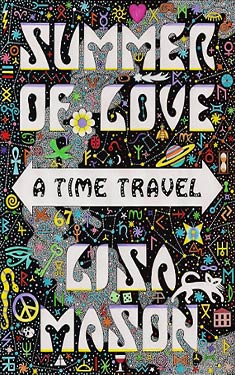WoGF Review: Summer of Love by Lisa Mason
 Stephen Poltz (spoltz)‘s love of anything SF and Fantasy was inspired by his childhood heroes Carl Sagan and JRR Tolkien. Oh yeah, and by watching cheesy ‘50s sci-fi movies on a black and white TV. He got a book-reading-reboot when he met his partner, Jacob, a voracious reader from a family of hard-core, genre fiction enthusiasts. After seeing a display of Hugo Award winning books at his local bookstore, Steve became obsessed with reading all the winners. Now, when not QAing software, learning Polish, or finding new books to read on WWEnd, he writes reviews on his blog It Started With The Hugos…
Stephen Poltz (spoltz)‘s love of anything SF and Fantasy was inspired by his childhood heroes Carl Sagan and JRR Tolkien. Oh yeah, and by watching cheesy ‘50s sci-fi movies on a black and white TV. He got a book-reading-reboot when he met his partner, Jacob, a voracious reader from a family of hard-core, genre fiction enthusiasts. After seeing a display of Hugo Award winning books at his local bookstore, Steve became obsessed with reading all the winners. Now, when not QAing software, learning Polish, or finding new books to read on WWEnd, he writes reviews on his blog It Started With The Hugos…
 For some reason, when somebody tells me, “You have to read this book,” I normally raise my hackles and resist. I prefer discovering books on my own, perusing the shelves at the library or bookstore, or finding a recommendation on a website or NPR. Over time, I’ve learned to keep those hackles a little lower and be more open to other people’s suggestions, but it still creates cognitive dissonance in my head. So when my partner recommended Summer of Love by Lisa Mason to fill my time while waiting for a hold on my next book at the library, I reacted with outward enthusiasm and my usual internal hesitancy. He’s a good judge of books, and I know that; I’ve read his recommendations before. The psychedelic-designed cover of his trade paperback first edition is in tatters from the numerous rereads, so I know he loves it. I needed another book for my Women of Genre Fiction challenge anyway. I acceded and took the book… and loved every word.
For some reason, when somebody tells me, “You have to read this book,” I normally raise my hackles and resist. I prefer discovering books on my own, perusing the shelves at the library or bookstore, or finding a recommendation on a website or NPR. Over time, I’ve learned to keep those hackles a little lower and be more open to other people’s suggestions, but it still creates cognitive dissonance in my head. So when my partner recommended Summer of Love by Lisa Mason to fill my time while waiting for a hold on my next book at the library, I reacted with outward enthusiasm and my usual internal hesitancy. He’s a good judge of books, and I know that; I’ve read his recommendations before. The psychedelic-designed cover of his trade paperback first edition is in tatters from the numerous rereads, so I know he loves it. I needed another book for my Women of Genre Fiction challenge anyway. I acceded and took the book… and loved every word.
Chiron Cat’s Eye in Draco, a time traveler from the year 2467, comes back to San Francisco 1967, the Summer of Love, to find a young girl, Susan Stein, aka Starbrite. His mission is to protect her so that the timeline leading to his present, his Now, is conserved. Ruby A. Maverick, a metaphysical shop owner in the Haight district, meets Susan and later Chi, and reluctantly lets them crash at her place. Together they must make it through the summer avoiding the craziness of the hippy culture and demons of an alternative future.
 Of the three major characters, Ruby was my favorite. She starts out as an antagonist to Starbrite and believes Chi is a narc. Over the course of the book, she reveals herself to be a wise, critical, and caring voice without losing the edge which the reader gets to taste at the start of the book. She’s sassy and earthy, not simply the two-dimensional woo-woo stereotype you would imagine as the owner of a metaphysical store.
Of the three major characters, Ruby was my favorite. She starts out as an antagonist to Starbrite and believes Chi is a narc. Over the course of the book, she reveals herself to be a wise, critical, and caring voice without losing the edge which the reader gets to taste at the start of the book. She’s sassy and earthy, not simply the two-dimensional woo-woo stereotype you would imagine as the owner of a metaphysical store.
The book is filled with colorful minor characters. As the minor characters are fleshed out, the reality of the Summer of Love is revealed. It begins with optimism and a sense of wonder and hope, and the minor characters are fanciful idealistic hippies, much as you’d expect from the stereotypes of the 60’s. As the summer progresses, we learn what’s behind these characters, and the movement, the problems, fear, despair, and seediness.
The book is masterfully told from the perspective of each of the main characters. It is divided into sections, and each section contains three chapters, one for each of the voices. The plot moves linearly through each voice and chapter, providing the reading with rich character development from a first-person as well as two third-person perspectives. This structure also gives you three experiences of the Summer of Love: naïve, outsider, and insider. Together, it works into a seamless, exciting, and interesting narrative.
What surprised me most about the book was the hardness of the science fiction. Considering the context, I was expecting a much softer SF novel. Instead, the author went into great detail explaining Chi’s world of 2467, the mechanism of time travel, the gadgets, and the interactions with the alternative future. At the same time, she examines in depth the issues of the mid-60’s: racial tensions, women’s rights, drug culture, and general societal change. We get to explore a fine blend of hard and soft through the perspectives of all three characters.
One interesting point regarding the structure of the novel is that it is told in present tense. My partner warned me that it might take a little getting used to. I’ve struggled with other present tense novels before, namely, The Yiddish Policeman’s Union. However, I settled into it with no problems. The prose is that good. I’m a slow reader, but I read this more slowly than usual because every word seemed important and every sentence necessary for feeling immersed in the story.
This is a 5 star book. Not only was it excellent, but it moved me intensely. I felt connections with the characters. I wanted to be a runaway in 1967. I wanted to own a metaphysical store in town of hippies. I wanted to stand hand-in-hand at the edge of existence and since songs from Sgt. Pepper. I did not want it to end.



















 Full Details
Full Details


2 Comments
What a great review! I’m always a little suspicious, though, about historical fiction-ish things dealing with the 60s–does it treat the 60s as a sad, misguided era of drugs and headbands and peace signs? Or as a deeper cultural revolution, which addressed seriously the problems of patriarchy, racism, and Western imperialism? Because I’m a little allergic to anything that smells trivializing…
Hi Alix, I believe it’s both. And the character arcs represent that. There’s Chi the time traveller, who begins negatively but comes to realize the possibilities; Ruby, a long time resident of Haight-Ashbuy, who was already part of the movement but is not happy with the chaos the summer of love brings to the area; and Starbrite, the naif who has the potential to really effect change. The dreams of the Summer of Love and the reality that undermined it are both presented. And I don’t think anything is trivialized. I found it quite profound.
Sorry, the comment form is closed at this time.